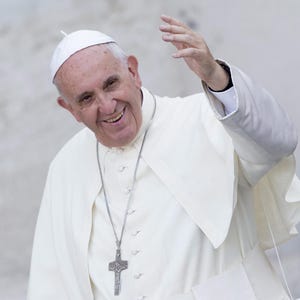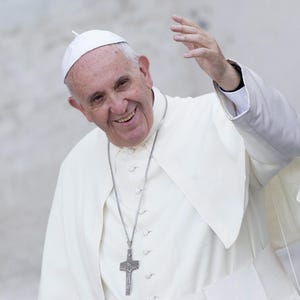Shannon Green and Gregg Zoroya discuss the encyclical from Pope
Francis to be issued by the Vatican on Thursday, June 18, and the
excitement it engenders among climate scientists.
"I invite everyone to accept with open hearts this document," Pope Francis told tourists and pilgrims gathered outside the Vatican on Wednesday. "Our 'house' is being ruined, and that hurts everyone, especially the poorest among us."
But while a core number of American bishops, joined by Catholic environmental and grassroots groups, will ring in the unveiling with some enthusiasm, it remains to be seen how the bulk of those leading the largest single church in the U.S. — with nearly 72 million Catholics — will respond.
Two archbishops, including the president of the U.S. Conference of Catholic Bishops, will offer reaction at a news conference in Washington on Thursday morning. A handful of others will do the same at media events across the country.
But the vast majority of America's 270 Catholic bishops will be left to decide how aggressively to push teachings they received in secret Tuesday, said the Rev. Manuel Dorantes, a Vatican spokesman.
"I think once they get the encyclical, they read it and they see what the Holy Father said, there's going to be more bishops on board," he said.
According to a draft version leaked Monday, Pope Francis states global warming is mostly due to human activity and the burning of fossil fuels.
Already active are the Jesuits, of whom Francis is the first to be elected pope. More than a dozen Jesuit institutions across the country will hold prayer masses Thursday in support of the encyclical.
Catholic Climate Covenant, an environment education and advocacy network, is working with the conference to send out prepared sermons on the pope's climate teachings with the goal of encouraging the delivery of such remarks Sunday, said Dan Misleh, Climate Covenant executive director.
Other initiatives include encouraging bishop-led media events on local climate-change impacts, sending parishes printed summaries of the encyclical to slip into church bulletins, designing and distributing interactive video programs and urging the tolling of bells across the nation at noon June 28 — one of the first Sundays after the encyclical's release.
Catholic environmental groups are pushing even harder, organizing congressional district events, particularly for Congressmen and women who are Catholic, to hand them copies of the document and "really ask them with a very prayerful and open heart to read it," said Patrick Carolan of the Franciscan Action Network.
For many organizers in the U.S., it could be an uphill struggle: A significant percentage of U.S. Catholics don't believe global warming is caused by human activity.
Half of Republican Catholics don't believe in global warming at all, and of those who do, only 25% say it is caused by man, according to a Pew Research Center survey published this month.
Among Catholic Democrats, 80% believe global warming is real, with six out of 10 saying it is caused by man.
Overall, nearly nine out of 10 American Catholics view Pope Francis favorably, placing large numbers of U.S. Catholics at odds with their feelings for the pontiff and his core conclusions in his encyclical.
American bishops appointed by Francis' more conservative predecessors, Pope Benedict XVI and Pope Paul II, constitute much of today's leadership. They've focused on issues such as opposing abortion and same-sex marriage. At a conference earlier this month, only a few dozen attended a workshop on the environment, according to the New York Times.
"I think you will see some bishops who will grab (the climate encyclical) and run with it, be very supportive," said the Rev. Thomas Reese, a senior analyst at the Catholic National Reporter. "Other bishops … they won't attack it. They won't criticize it. They just won't be out there pushing it as hard as other people."
Organizers hope to build on the momentum of the encyclical's release and keep attention focused on it through late September, when the pope visits the White House, addresses a joint session of Congress — the first pontiff to do so — and speaks to the U.N. General Assembly, during a trip to Washington, New York and Philadelphia. Prayer vigils and fasting are planned to mark the events.
"It is stunning," Misleh said of the publicity accompanying release of the encyclical. "I have not seen anything like this, and I have worked in the Catholic Church all my life."
But even he concedes some in the U.S. Catholic leadership might be slow to capitalize on the momentum.
"They also have a lot of other concerns," Misleh said. "They have a lot of other issues that they deal with locally, and in the states and nationally. So I think it's unrealistic to expect them to drop everything they're doing and just focus on the environment."





No comments:
Post a Comment